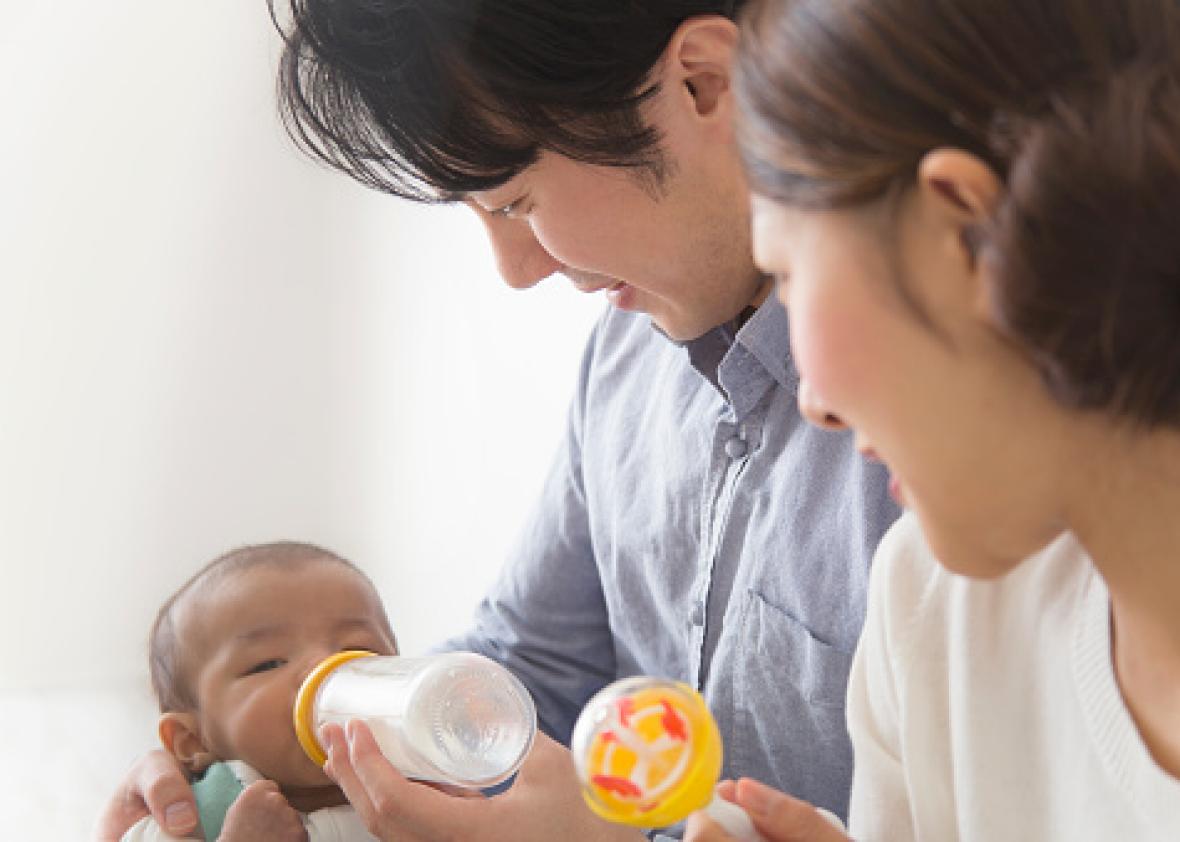The “breast is best” ideology is so ubiquitous, so sneakily persuasive, that even those determined to remain open-minded to feeding options are overcome with guilt and panic when they press that first bottle of formula against their newborn’s lips. I’ve known many moms over the years whose prepartum insouciance was no match for the combination of vulnerability-inducing postpartum hormones and heavily biased lactation consultations offered by their hospitals. In fact, I was one such mom, and I felt like an absolute failure for having to give my son formula before my milk came in. That the alternative was his starving—dangerous for a newborn—did little to put me at ease.
In hindsight, I see how ridiculous I was acting, but I don’t blame myself for it. Following the birth of one’s first child, most of us are not in a good place to challenge orthodoxies on our own. We need both support and easily accessible, evidence-based information to remind us of why giving newborns formula isn’t a sign of weakness, or a lifestyle choice, but a completely sane health decision. The Fed Is Best Foundation, a new nonprofit created to help educate moms on the risks of starvation for newborns, is trying to fill this role.
The organization was started by Christie del Castillo-Hegyi, an emergency physician who researches newborn brain injury and breast-feeding complications, and Jody Segrave-Daly, a newborn nursery and newborn intensive care unit nurse and certified lactation consultant. The goal: to counter “alarming trends in infant feeding, namely a rise in hospitalizations for feeding complications in exclusively breastfed newborns who don’t receive enough breast milk, including increasing rates of jaundice, hypoglycemia, and dehydration, which can threaten a newborn’s brain.”
The group’s concern is that the pressure to only breast-feed is bad advice for the many women—Fed Is Best quotes 1 in 5—who don’t make enough milk during the first few days of their children’s lives. The statistics are harrowing: 10 to 25 percent of exclusively breast-fed babies experience excessive weight loss in the first days of life; 10 to 18 percent of exclusively breast-fed babies experience starvation jaundice from insufficient milk; and 10 percent of exclusively breast-fed babies experience levels of hypoglycemia (low blood sugar), which can be associated with developmental complications. Also, the most common reason an exclusively breast-fed newborn is rehospitalized is due to problems related to insufficient feeding.
Women are told to avoid formula and bottles in the early days of breast-feeding because, many breast-feeding advocates claim, it might confuse the newborn and make them less interested in feeding from the breast. I was told exactly this in the well-regarded New York City hospital where I delivered. The lactation consultant in charge of giving a breast-feeding presentation to new moms made it sound as though nipple confusion was an inevitability (far from it), and one taste of formula would be a death knell for breast-feeding (actually, it can lead to breast-feeding success.) Here’s how she put it: “The billion-dollar formula industry makes formula nice and sweet, so once babies get a taste of that they don’t want anything else.” I knew it wasn’t true, and yet, I couldn’t help but internalize the message.
And so did Fed Is Best co-founder del Castillo-Hegyi. In an open letter posted on the foundation’s website, she explains how her attempt to exclusively breast-feed her son led to him going without food for a few days, after which he was rehospitalized and treated in neonatal intensive care unit. Later on, he was diagnosed with multiple neuro-developmental disabilities, which motivated del Castillo-Hegyi to research whether the diagnoses were a result of the short period of starvation he experienced as a newborn. She looked through peer-reviewed journals and “found that there is ample evidence showing the links between neonatal jaundice, dehydration, hypoglycemia and developmental disabilities.” She goes on to suggest that “the answer to the epidemic of developmental disabilities,” including autism spectrum disorder, ADHD, sensory processing disorder, severe speech delay, seizure disorders, and motor impairments, “we are seeing may be found in this vulnerable period.”
Del Castillo-Hegyi ends her letter with a list of recommendations to prevent newborn starvation. These include: a requirement for mothers to hand express milk before they feed to ensure there is something for their children to eat; twice-daily weighing for exclusively breastfed newborns in the hospital and at home to ensure they aren’t losing a dangerous amount of weight; daily glucose monitoring for newborns to ensure they are not hypoglycemic; and universal education for mothers on the threats of dehydration, jaundice, and hypoglycemia, as well as the complications that might arise from letting such conditions go untreated. If I had only had the latter, both my son and I would have been more at ease during the first two days of his life as we waited for my milk to come in.
